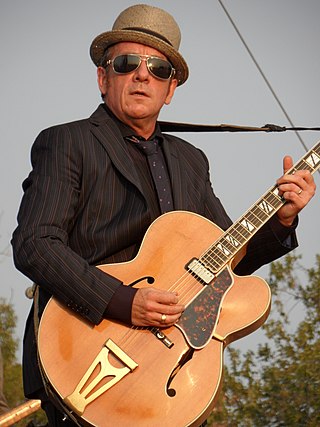
Declan Patrick MacManus, better known by his stage name Elvis Costello, is an English singer, songwriter, record producer, author and television host. According to Rolling Stone, Costello "reinvigorated the literate, lyrical traditions of Bob Dylan and Van Morrison with the raw energy and sass that were principal ethics of punk", noting the "construction of his songs, which set densely layered wordplay in an ever-expanding repertoire of styles." His first album, My Aim Is True (1977), spawned no hit singles, but contains some of Costello's best-known songs, including the ballad "Alison". Costello's next two albums, This Year's Model (1978) and Armed Forces (1979), recorded with his backing band the Attractions, helped define the new wave genre. From late 1977 until early 1980, each of the eight singles he released reached the UK Top 30. His biggest hit single, "Oliver's Army" (1979), sold more than 500,000 copies in Britain. He has had more modest commercial success in the US, but has earned much critical praise. From 1977 until the early 2000s, Costello's albums regularly ranked high on the Village Voice Pazz & Jop critics' poll, with This Year's Model and Imperial Bedroom (1982) voted the best album of their respective years. His biggest US hit single, "Veronica" (1989), reached number 19 on the Billboard Hot 100.

Mighty Like a Rose is the 13th studio album by the British rock singer and songwriter Elvis Costello, released in 1991 on compact disc as Warner Brothers 26575. The title is presumably a reference to the pop standard "Mighty Lak' a Rose", and although that song does not appear on the album, the words of its first stanza are quoted in the booklet of the 2002 reissue. It peaked at No. 5 on the UK Albums Chart, and at No. 55 on the Billboard 200.
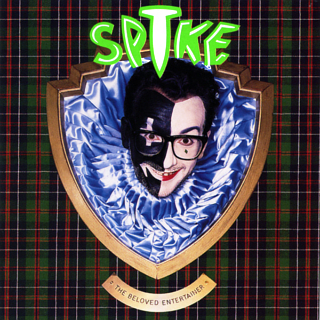
Spike is the 12th studio album by English singer-songwriter Elvis Costello, released in 1989 by Warner Bros. Records. It was his first album for the label and first release since My Aim Is True with no appearance by the Attractions. It peaked at No. 5 on the UK Albums Chart and also reached the Billboard 200 at No. 32, thanks to the single and his most notable American hit, "Veronica", which reached No. 19 on the Billboard Hot 100 and No. 1 on the US Modern Rock chart. In The Village Voice's annual Pazz & Jop critics poll for the year's best albums, Spike finished at No. 7.

Blood & Chocolate is the eleventh studio album by the English singer-songwriter Elvis Costello, and his ninth album with the Attractions—keyboardist Steve Nieve, bassist Bruce Thomas and drummer Pete Thomas. It was released on 15 September 1986 through Demon and Columbia Records. After mostly using outside musicians for his previous album King of America, Costello reunited the Attractions and his former producer Nick Lowe for Blood & Chocolate. Recorded in London during a period of heightened tensions between Costello and the Attractions, the tracks were recorded quickly, mostly live in first takes, while the band were set up simultaneously in the same room at Olympic Studios. The Pogues' bassist Cait O'Riordan sang backing vocals on two tracks.

King of America is the tenth studio album by the English singer-songwriter Elvis Costello, released on 21 February 1986. Co-produced by Costello and T Bone Burnett, the album originated following a series of tours the two made under the name "the Coward Brothers". Recording took place in mid-1985 at various studios in Los Angeles, California, with a group of American session musicians dubbed "the Confederates". Selected by Burnett, they included Ray Brown, Earl Palmer and former members of Elvis Presley's TCB Band. Costello's regular backing band, the Attractions, were intended to appear on half of the album before poor sessions led to them appearing on only one track, "Suit of Lights".
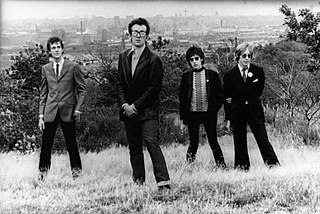
The Attractions were an English backing band for the English new wave musician Elvis Costello between 1977 and 1986, and again from 1994 to 1996. They consisted of Steve Nieve (keyboards), Bruce Thomas, and Pete Thomas (drums). They also released one album as an independent entity, without Costello, in 1980.

Peter Michael Thomas is an English rock drummer best known for his collaboration with singer Elvis Costello, both as a member of his band the Attractions and with Costello as a solo artist. Besides his lengthy career as a studio musician and touring drummer, he has been a member of the band Squeeze during the 1990s and a member of the supergroup Works Progress Administration during the early 2000s.
Bruce Thomas is an English bass guitarist, best known as bassist for the Attractions; the band formed in 1977 to back Elvis Costello in concert and on record.
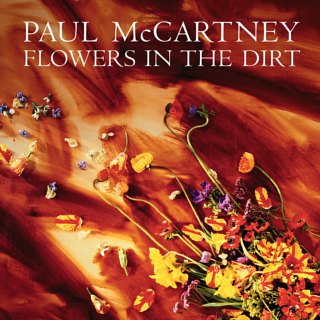
Flowers in the Dirt is the eighth solo studio album by Paul McCartney. The album was released on 5 June 1989 on Parlophone, as he was embarking on his first world tour since the Wings Over the World tour in 1975–76. It earned McCartney some of his best reviews for an album of original songs since Tug of War (1982). The album made number one in the United Kingdom and Norway and produced several hit singles. The album artwork was a collaboration between artist Brian Clarke, who painted the canvas and arranged the flowers, and Linda McCartney, who produced the cover photography.

The Very Best of Elvis Costello is a compilation album by English musician Elvis Costello, first released on 21 September 1999 through Polygram Records. The album spanned his recorded work from 1977 through 1998. It was re-released less than two years later on Rhino Records as the first entry in their comprehensive Costello reissue series.
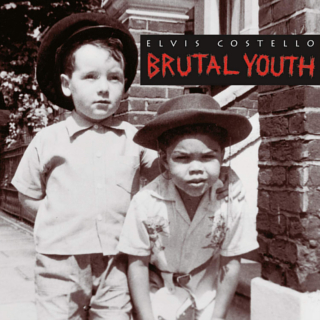
Brutal Youth is an album by English musician Elvis Costello, released in 1994. It contains the first recordings Costello made with his band the Attractions since Blood and Chocolate (1986). Brutal Youth was the third, and most recent of Costello's albums, to peak at number two in the UK Albums Chart, following on from Armed Forces (1979) and Get Happy!! (1980).

The Juliet Letters is a studio album by the British rock singer and songwriter Elvis Costello and British string quartet Brodsky Quartet, released in 1993 by Warner Bros. Records. Costello described the album as "a song sequence for string quartet and voice and it has a title. It's a little bit different. It's not a rock opera. It's a new thing." It peaked at No. 18 on the UK Albums Chart, and at No. 125 on the Billboard 200.
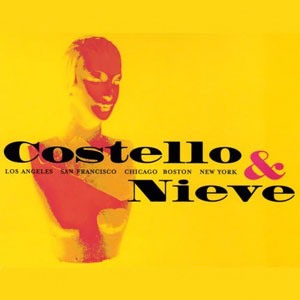
Costello & Nieve is a limited edition five-disc live album by Elvis Costello and Steve Nieve, released in 1996. It was recorded in Los Angeles, San Francisco, Chicago, Boston and New York City.

For the Stars is a collaboration album by classically trained Swedish mezzo-soprano Anne Sofie von Otter and Elvis Costello, released in 2001.

Extreme Honey: The Very Best of Warner Brothers Years is a compilation album by Elvis Costello, released in 1997. The album spanned songs from 1989 to 1997 that Costello had released under his contract with Warner Bros. Records.

"The Only Flame in Town" is a song written by new wave musician Elvis Costello and recorded by Costello with his backing band the Attractions. The song appeared on Costello's 1984 album, Goodbye Cruel World. Originally written in the style of a classic torch song, "The Only Flame in Town" was reworked by producers Clive Langer and Alan Winstanley in a more pop-friendly style. This final version features Daryl Hall of Hall & Oates on backing vocals.
"You Bowed Down" is a song written by Elvis Costello, first released by Roger McGuinn on his album Back from Rio. Costello recorded his own version of the song for his 1996 album All This Useless Beauty.
"Complicated Shadows" is a song written by new wave musician Elvis Costello and recorded by Costello with his backing band the Attractions. The song appeared on Costello's 1996 album, All This Useless Beauty.

The Costello Album, also The McCartney/MacManus Collaboration, is a Paul McCartney album that includes work from his 1987–88 songwriting collaboration with Elvis Costello. The album includes demo recordings made by Paul and Elvis in the throes of their collaboration, other demos of some songs by Costello and McCartney individually, live performances by Costello, and two duo live performances taken from a 1995 benefit concert at the Royal College of Music. A planned album credited to both was abandoned, initial work-ups appearing in the 2017 deluxe edition reissue to McCartney's Flowers in the Dirt. These recordings were unknown to the public until 1998 when they surfaced as an unofficial compact disc titled The McCartney/MacManus Collaboration.
"The Other End (Of the Telescope)" is a song by American band 'Til Tuesday, which was released in 1988 on their third and final studio album Everything's Different Now. The song was written by Aimee Mann and Elvis Costello. Costello recorded his own version of the song for his 1996 album All This Useless Beauty.
















